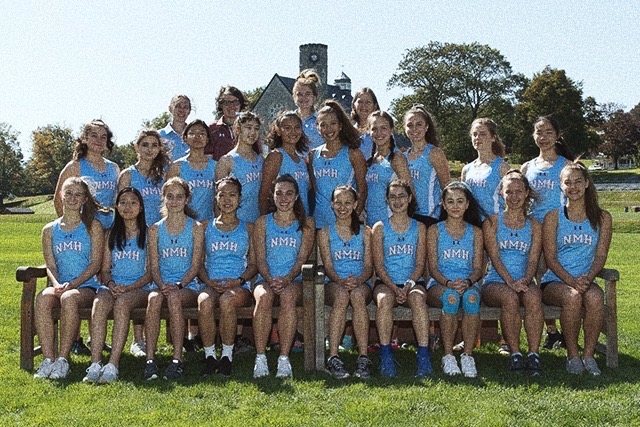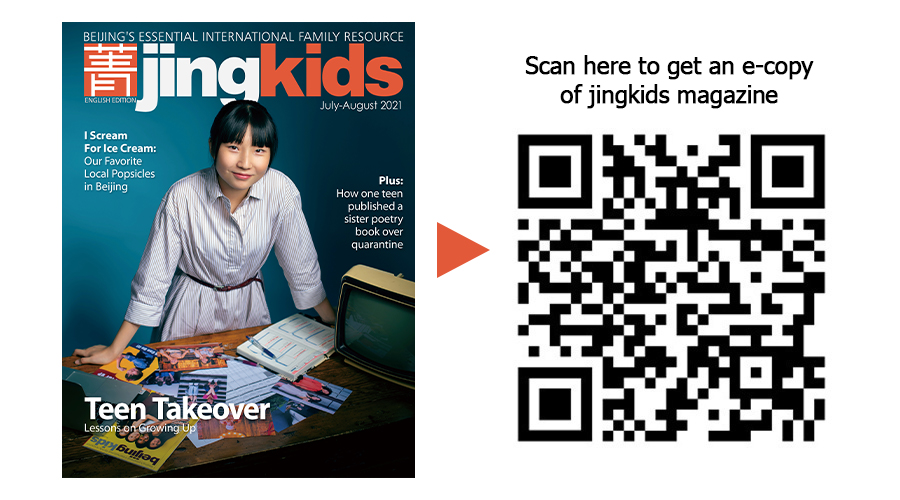Scrambling out of my magnetizing bed at 6.57am, forcing my eyes open with eye drops, dashing to the student center to scrub the windows for 50 minutes while memorizing a 20-line poem, charging for the dining hall to gobble down leftovers after 600 students have eaten, sprinting down a steep hill covered with a thin sheet of ice – until I land on my butt. I get up, limp to my classroom that looks more like a dilapidated factory than an academic building, and awkwardly shuffle to my seat as my teacher gives me a tardy point.
No, I don’t go to a public school in Beijing, nor am I hired as a building cleaner: Welcome to my boarding school life, atop a mountain in Gill, Massachusetts.
 Growing up in Beijing’s CBD and riding a private car to Beijing City International School (BCIS) every day from nursery to 8th grade (yes, I repeated nursery), I can safely say that I had lived a life of opulence and blitheness, complete with a deep and abiding dependency on my ayi. BCIS was merely a venue for learning, nothing more. So even with my terminal procrastination, I still submitted every assignment without having to put in a whole lot of effort, feeling moderately challenged but mostly manageable by way of some occasional cramming, all the while sparing some time for personal interests and recreation. Did I grow? Education-wise, yes. Height-wise, yeah (albeit slowly). Life skills, self-awareness, and worldview? Not so much.
Growing up in Beijing’s CBD and riding a private car to Beijing City International School (BCIS) every day from nursery to 8th grade (yes, I repeated nursery), I can safely say that I had lived a life of opulence and blitheness, complete with a deep and abiding dependency on my ayi. BCIS was merely a venue for learning, nothing more. So even with my terminal procrastination, I still submitted every assignment without having to put in a whole lot of effort, feeling moderately challenged but mostly manageable by way of some occasional cramming, all the while sparing some time for personal interests and recreation. Did I grow? Education-wise, yes. Height-wise, yeah (albeit slowly). Life skills, self-awareness, and worldview? Not so much.
Although boarding schools – typically private secondary schools in the US and UK at which students live on campus – might be a distant concept to some, the number of Chinese families sending their kids abroad before college has soared over the past ten years. When I first learned about this opportunity, it sounded fascinating, if not a little bit sketchy. Yet, after hearing positive reviews from my friends who were already boarding, I decided to transfer out of BCIS. I hoped to immerse myself in a more intellectually stimulating milieu, hopefully not as mundane as the one I’d been part of. Undoubtedly, Northfield Mount Hermon (the boarding school I now attend) did offer me that, but more importantly, it made me realize that having lived in such a privileged bubble, I lacked the most rudimentary skills like reaching out for help, doing laundry, and advocating for myself. What’s more, I had to grasp all this in a foreign cultural sphere, 10,786km from home.
 I encountered my first “growth spurt” during an agonizing ten-month test prep process that revealed an environment similar to the exam-oriented education system at Chinese public schools. From March of 7th grade to November of 8th grade, I prepared for two standardized tests that all boarding school applications required: a proficiency test for students who speak English as a second language known as the TOEFL test, and the Secondary School Admission Test called the SSAT (the secondary school version of the SAT). As long as you’re satisfied with your SSAT and TOEFL test scores – depending on where you wanted to fit in a hierarchy of boarding school applicants competing for a spot in a top 10, 20, 30, 50, or 100 tier institution ranked by Chinese boarding school advising counselors – you were good to go. Of course, it was already a test in and of itself, but I abhorred the bland, repetitive routine at my test prep center where the only thing that excited me was ordering waimai from a different place every day. But precisely because of the arduousness, I’d figured out how to juggle school and extracurricular activities while memorizing seemingly endless lists of words like “effluvium” and “neophyte” that frankly didn’t even sound like English to me, analyzing 18th-century authors’ intentions from book excerpts entirely devoid of context, summarizing college lectures and conversations between students and professors, and writing persuasive essays about whether competition among friends harmed friendship.
I encountered my first “growth spurt” during an agonizing ten-month test prep process that revealed an environment similar to the exam-oriented education system at Chinese public schools. From March of 7th grade to November of 8th grade, I prepared for two standardized tests that all boarding school applications required: a proficiency test for students who speak English as a second language known as the TOEFL test, and the Secondary School Admission Test called the SSAT (the secondary school version of the SAT). As long as you’re satisfied with your SSAT and TOEFL test scores – depending on where you wanted to fit in a hierarchy of boarding school applicants competing for a spot in a top 10, 20, 30, 50, or 100 tier institution ranked by Chinese boarding school advising counselors – you were good to go. Of course, it was already a test in and of itself, but I abhorred the bland, repetitive routine at my test prep center where the only thing that excited me was ordering waimai from a different place every day. But precisely because of the arduousness, I’d figured out how to juggle school and extracurricular activities while memorizing seemingly endless lists of words like “effluvium” and “neophyte” that frankly didn’t even sound like English to me, analyzing 18th-century authors’ intentions from book excerpts entirely devoid of context, summarizing college lectures and conversations between students and professors, and writing persuasive essays about whether competition among friends harmed friendship.
But even outperforming in the two standardized tests didn’t guarantee anyone a spot at their dream school. The actual application process was steadily creeping towards me. Later, I would realize that test prepping was nothing compared to the inexhaustible essays, recommendation letters, parent statements, activity lists, and interviews that I had to somehow get done in three months. Searching for a way out of this labyrinth became my second growth spurt. This time, however, the challenge wasn’t monotony – it was the opposite.

The essays wanted to know about a moment of adversity, a turning point in my life, my most meaningful educational experience, and how I would contribute to the community. I only knew how to gape blankly at the prompts. Virtually nothing came to mind, in part because I had never looked back at what I did over my 12 years at BCIS and how I came to be the person I was. I was unconscious about how I grew, who helped me, and my purpose in life. That’s when I began to panic. I had nothing to show to the schools. So the task at hand – to at least write something under the essay prompts – forced me to digest my weaknesses and flesh out certain aspects of me that stood out. There were epiphanies that enabled me to slowly begin piecing together the first 14 years of my life, but regrettably, the most impactful moments were still unexcavated. Filling out my activity list also proved to be perplexing. Some were pursuits that had already become a daily ritual like community service and practicing the piano, so giving up would be irreverent. Others were activities that I was plainly passionate about like photography and creative writing. Then there was the because-my-friend-did-it stuff such as basketball and drama. My unorganized activities also proved to be problematic when it was time for the interviews. I struggled to introduce my myriad interests to admissions officers through anecdotes when I couldn’t even make sense of why I set out to do those things in the first place. And although I understood that my extracurriculars would be more meaningful if I started to unearth the underlying purposes, increase them in magnitude, and connect them to form a more holistic picture, it was all too late. Admissions officers could tell at a glance any effort to beautify my story.
My third growth spurt happened after a phase of self-doubt and existential crisis that began in March of 8th grade and lasted until November of my freshman year at my new school. Receiving two offers, three rejections, and numerous waitlists left me with two choices: begrudgingly going to one of the two schools I was accepted to or continuing my high school years at BCIS.
 During the few months before I stepped onto campus, I was unmotivated to do anything because I felt my previous endeavors weren’t recognized. I was also overly optimistic about my adjustment to boarding school life. But as soon as I was thrown into the alien habitat, reality contrasted starkly with my previous unrealistic expectations and romanticizing of boarding school. It wasn’t merely a simplistic, triangular relationship between my dorm, the dining hall, and academic buildings. In fact, it wasn’t a school in the literal sense at all. It was like living in a reclusive little town, and I had to swiftly adapt and conform to the conventions of the place to survive. The dorm staff was my second family. I picked up my Amazon packages from the school mail center. I hauled down the overloaded laundry basket each week to the laundry room in the basement. We took a shuttle bus every Friday night to a supermarket to stock up food for weekend unwinding. There was a hidden social hierarchy among the student body. And academics – the only thing I was confident I could skillfully manage – was the thorniest to cope with. The AP curriculum was nothing like BCIS’s IB program. STEM classes were test-intensive and exceedingly challenging for a humanities-oriented student. And pressuring myself to live up to the stereotypical math geek Asian also demolished me. I refused to drop an honors math course that I was suffocating in. Asking teachers for help outside of class was a norm for which I never before bothered. A 4.0 GPA that was excruciating to preserve suddenly mattered so much. But the most formidable obstacle to overcome, without a doubt, was becoming friends with domestic students and chatting with my teachers because deep inside, I was ashamed of my broken conversational English that I never had the chance to use and improve, thanks only to writing in academic jargon in the classroom and habitually speaking Chinese with my friends outside.
During the few months before I stepped onto campus, I was unmotivated to do anything because I felt my previous endeavors weren’t recognized. I was also overly optimistic about my adjustment to boarding school life. But as soon as I was thrown into the alien habitat, reality contrasted starkly with my previous unrealistic expectations and romanticizing of boarding school. It wasn’t merely a simplistic, triangular relationship between my dorm, the dining hall, and academic buildings. In fact, it wasn’t a school in the literal sense at all. It was like living in a reclusive little town, and I had to swiftly adapt and conform to the conventions of the place to survive. The dorm staff was my second family. I picked up my Amazon packages from the school mail center. I hauled down the overloaded laundry basket each week to the laundry room in the basement. We took a shuttle bus every Friday night to a supermarket to stock up food for weekend unwinding. There was a hidden social hierarchy among the student body. And academics – the only thing I was confident I could skillfully manage – was the thorniest to cope with. The AP curriculum was nothing like BCIS’s IB program. STEM classes were test-intensive and exceedingly challenging for a humanities-oriented student. And pressuring myself to live up to the stereotypical math geek Asian also demolished me. I refused to drop an honors math course that I was suffocating in. Asking teachers for help outside of class was a norm for which I never before bothered. A 4.0 GPA that was excruciating to preserve suddenly mattered so much. But the most formidable obstacle to overcome, without a doubt, was becoming friends with domestic students and chatting with my teachers because deep inside, I was ashamed of my broken conversational English that I never had the chance to use and improve, thanks only to writing in academic jargon in the classroom and habitually speaking Chinese with my friends outside.
Nevertheless, despite it all, each stage of growth in my boarding school career equipped me with a new set of skills: Preparing for standardized tests instilled a work ethic to plow ahead despite the tedium, which is often a prerequisite for more engaging and promising opportunities in the future (I like to refer to the Chinese idiomatic phrase, 꼇넜욈庫等척끼돤죄鏡庫 bù chī kǔ tóu zěn me cháng de liǎo tián tóu —you have to eat bitter before you can taste sweetness); working on my application taught me to think critically about every decision I make and undergo constant introspection; contemplating a transient failure and figuring out the rules of boarding school, not to mention living away from home, prepared me for major life transitions. Yes, boarding school is a real hustle, but I can’t imagine another disoriented four years had I stayed at BCIS.
 Furiously typing out unrelated sentence fragments for my English essay at 10.15pm, scuffling down the stairs to sign-in for the night, resuming my not nearly finished business, alerted by my 10.27pm alarm to dart down the corridor to wash up in the shared bathroom, rushing back to my room to leap under my blanket just in time for lights-out at 10.30pm My day is far from over. As soon as the resident leader says good night and closes our door, I use all my strength to lunge myself out of my magnetizing bed, hoping that someday lights-out for me will manifest its literal meaning. I switch on my desk lamp and continue my grind. It’s 1.04am when I finish the last sentence in my essay. I dive into bed and my mind dozes off a second after. All I know is that my nightly two-hour TikTok binge routine is lost – extinct, actually – here. Thankfully, it will not be missed.
Furiously typing out unrelated sentence fragments for my English essay at 10.15pm, scuffling down the stairs to sign-in for the night, resuming my not nearly finished business, alerted by my 10.27pm alarm to dart down the corridor to wash up in the shared bathroom, rushing back to my room to leap under my blanket just in time for lights-out at 10.30pm My day is far from over. As soon as the resident leader says good night and closes our door, I use all my strength to lunge myself out of my magnetizing bed, hoping that someday lights-out for me will manifest its literal meaning. I switch on my desk lamp and continue my grind. It’s 1.04am when I finish the last sentence in my essay. I dive into bed and my mind dozes off a second after. All I know is that my nightly two-hour TikTok binge routine is lost – extinct, actually – here. Thankfully, it will not be missed.
Author’s note: Both NMH and BCIS and the like may suit some and not others. This article only represents my views of my circumstances and should not be used to assess others or generalize the pros and cons of boarding and international schools.

This article appeared in the jingkids 2021 July-August issue



